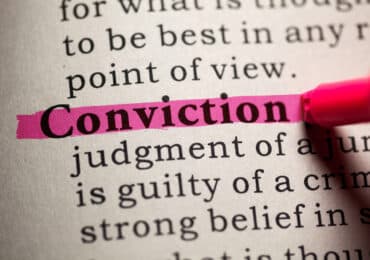A criminal conviction occurs when a court of law finds a defendant guilty. This follows a legal process where the prosecution must prove the defendant’s guilt beyond a reasonable doubt. The legal consequences of a criminal conviction may vary depending on the severity of the crime but often include fines, jail time, and a permanent record of the offense. Understanding the implications of a criminal conviction is crucial, as it can affect your future employment, travel, and civil rights.

Read on to learn what a criminal conviction is and how to avoid it.
The Legal Process Leading To A Conviction
Understanding the legal proceedings that lead to a criminal conviction can help you better navigate the complexities of the justice system. Here’s what typically happens:
- Arrest and Charges: The process begins with an arrest, after which the prosecutor files formal charges.
- Arraignment: The defendant was formally read the charges and asked to enter a plea.
- Preliminary Hearing/Grand Jury: Evidence is reviewed to determine if there’s enough to proceed to trial.
- Trial: Both sides present evidence and arguments.
- Verdict: A judge or jury determines the defendant’s guilt.
- Sentencing: If convicted, the defendant is sentenced.
By understanding the stages of a criminal conviction, you can deal with the entire process more effectively.
How To Avoid A Criminal Conviction
Avoiding a criminal conviction primarily involves legal strategies and understanding one’s rights. Here are key considerations to keep in mind when facing criminal charges:
Seek Competent Legal Representation
Securing legal representation is critical in influencing the outcome of a legal case. A competent defense attorney understands the law’s intricacies and effectively navigates the court system’s complex criminal procedure. For example, suppose you’re facing criminal charges in Mesa or your local area. In that case, hiring a local lawyer specializing in criminal defense can significantly enhance your chances of a favorable outcome. These professionals are equipped to identify legal nuances, offer legal advice, file the appropriate motions, and advocate vigorously on your behalf.
Understand Your Rights
From the moment of arrest, understanding your legal rights is paramount. Some key rights include:
- Right to Remain Silent: You don’t have to speak to the police without an attorney present.
- Right to an Lawyer: You have the right to seek legal representation; if you can’t get one, an attorney will be provided for you.
- Right to a Fair Trial: You’re entitled to a criminal trial by jury and the right to confront your accuser.
Awareness of these rights can prevent unintended waivers of defense and ensure that any interaction with law enforcement doesn’t compromise your legal standing.

Implement Strategies To Strengthen Your Defense
A robust defense strategy is essential for challenging criminal charges effectively. Here’s how you can solidify your defense:
- Evidence Review: Thoroughly examine the prosecution’s evidence for weaknesses or legal shortcomings. Look for inconsistencies or errors in the evidence that could undermine the criminal case against you.
- Witness Testimonies: Collect and present testimonies from credible witnesses who can corroborate your narrative or dispute the prosecution’s version of events.
- Alibi: If relevant, furnish proof that places you at a different location at the time of the alleged crime. This could include video footage, receipts, or witness accounts that confirm your whereabouts, thus strengthening your defense.
- Self-Defense: This defense justifies the defendant’s actions as necessary to protect themselves from immediate harm or threat. Legal acceptance requires proving the perceived threat, the response’s necessity, and the force’s reasonableness.
- Insanity: Claiming insanity involves demonstrating that the defendant was suffering from a severe mental health issue at the time of the crime that impaired their ability to distinguish right from wrong or to control their actions according to the law.
With these defenses in place, you can improve your chances of avoiding a criminal conviction that can affect your life in the long run.
Negotiate A Plea Bargain
Often, plea bargaining can result in lesser charges or reduced sentencing. This involves negotiating with the prosecutor by agreeing to plead guilty to a lesser offense for a lighter sentence.
Consequences Of A Criminal Conviction
A criminal conviction can have long-lasting impacts on an individual’s life. These include:
- Criminal Record: A permanent criminal conviction record can hinder employment since many employers conduct background checks.
- Loss of Rights: Criminal convictions can result in losing voting rights, firearm ownership rights, and other civil liberties.
- Social Stigma: Convicted individuals often face social ostracism and challenges in community integration.
- Financial Strain: Legal fees, fines, and possible job loss can have significant financial repercussions.
Understanding these consequences can give you insights into handling criminal charges more effectively.
Preventive Measures To Minimize Legal Risks
Taking proactive steps can significantly reduce the likelihood of facing criminal charges. These include:
- Awareness of the Law: Stay informed about the laws and regulations applicable to your actions.
- Avoid Risky Situations: Steer clear of scenarios where criminal activity could occur.
- Consult Legal Advice: Regular consultations with a legal advisor can prevent inadvertent law violations.
By mitigating the impact of a criminal conviction, you can restore your rights and reduce stigma.
Conclusion
Understanding what constitutes a criminal conviction and how to navigate and possibly avoid it is essential for safeguarding your freedom and future. By taking informed steps and securing competent legal representation, you can significantly mitigate the risks associated with criminal charges.

